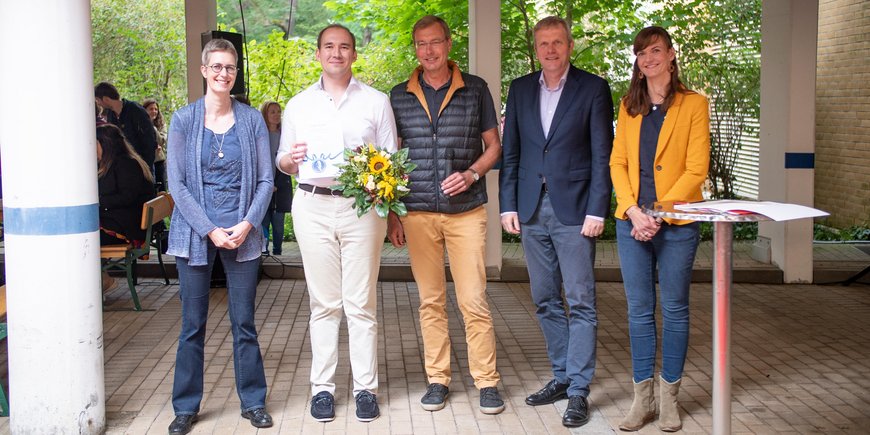Dr Artem Smirnov, who very successfully completed his dissertation in Section 2.7 “Space Physics and Space Weather” in October 2023, was awarded the Friedrich Robert Helmert Prize for the best doctoral thesis of 2023. The prize is awarded annually by the GFZ Friends, the association of friends and sponsors of the GFZ, and comes with prize money of 1,500 euros.
The honoured doctoral thesis
Artem Smirnov receives the prize for his doctoral thesis on “Understanding the Dynamics of the Near-Earth Space Environment Utilising Long-term Satellite Observations”. This dissertation deals with the dynamics of near-Earth space, from the upper atmosphere to several tens of thousands of kilometres into space. Here, the dynamics of charged particles of varying density and speed determine the conditions of so-called space weather, which harbours considerable potential for disruption and danger for satellites, GNSS navigation systems (Global Navigation Satellite System) as well as aircraft and technical systems on Earth.
The most remarkable part of Artem Smirnov's PhD thesis is the development of a neural network-based model of electron density in the topside ionosphere (NET), which was published in Nature Scientific Reports in 2023. The introduction of the NET model represents a paradigm shift in the modelling of the ionosphere. This model, constructed based on 19 years of GNSS radio occultation data, outperforms the existing and well-established empirical International Reference Ionosphere (IRI) model by a factor of ten, demonstrating the potential of machine learning in improving our understanding of the Earth's ionosphere and our predictive capabilities. This model can be used in the future to predict times and locations where GNSS data may be inaccurate and, by calculating corrections, to improve GNSS positioning.
From the laudation
Artem Smirnov's PhD thesis represents a pioneering and comprehensive exploration of the near-Earth space environment, including the application of machine learning techniques. His work not only contributes significantly to our understanding of space dynamics, but also opens up avenues for practical applications. Leading scientists at NASA are currently working with Artem Smirnov's results, e.g. to improve GNSS positioning.
Artem Smirnov completed his PhD at the University of Potsdam in 4 years and graduated Summa Cum Laude. Until his defence he published 8 peer-reviewed first author publications and 20 co-author publications. Three of his recent publications were honoured as “Top downloaded paper” by the renowned US journals AGU and JGR Space Physics Journal. His h-index (the indicator for the worldwide perception of a scientist in professional circles) is 9, which is a remarkable achievement for a young scientist.
About Artem Smirnov
Dr Artem Smirnov studied at Lomonosov Moscow State University. His bachelor's thesis was recognised as the best in geophysics by the Russian Academy of Sciences in the Department of Solid Earth Physics in 2017. He then moved to Munich, where he completed his Master's degree in Geophysics with specialisation in Geomagnetism at the Technical University and the Ludwig-Maximilians University, with a guest stay at the Max Planck Institute for Solar System Research in Göttingen. In 2019, he came to Potsdam, where he worked for his doctoral thesis in the GFZ section ‘Space Physics and Space Weather’ and at the University of Potsdam. After successfully completing his doctorate, he is now a post-doctoral researcher at the LMU Munich and at GFZ – as part of a collaborative project of both institution.
About the Friedrich Robert Helmert Prize
Doctoral students contribute significantly to the success of the GFZ with their scientific achievements. Every year, the Friedrich Robert Helmert Prize is awarded to young scientists whose outstanding dissertations have contributed significantly to a better understanding of the Earth system. In addition to the prize money of 1500 euros, the award winners receive a certificate and a one-year honorary membership in the GFZ Friends, the Association of Friends and Supporters of the GFZ. The prize money is not earmarked for a specific purpose.
Further information on the prize and the call for entries can be found here:
https://www.gfz-friends.de/en/phd-award







![[Translate to English:] Fire in a forest, smoke rising, aerial view from above](/fileadmin/_processed_/8/3/csm_2025_01_06_AdobeStock_415831729_5a0e6d50d3.jpeg)









![[Translate to English:] [Translate to English:] Abror Gafurov von dem Schriftzug "Welcome to Azerbaijan" und den UN und COP Logos](/fileadmin/_processed_/2/5/csm_2024_11_Baku_COP29_Abror_Gafurov_1042faec82.jpeg)


![[Translate to English:] Martin Herold standing in front of the library on the Telegrafenberg](/fileadmin/_processed_/c/d/csm_Martin_Herold_d385ee4dd9.jpeg)
![[Translate to English:] Many people are listening to a presentation in the GFZ lecture hall.](/fileadmin/_processed_/c/a/csm_1_Bild1_hell_b9c0e9f5ed.jpeg)






![[Translate to English:] Both scientists sitting on stools in front of a wall of books in the Telegrafenberg library](/fileadmin/_processed_/6/6/csm_Buiter_Castell_DORA_4_e87cb1ea18.jpeg)
![[Translate to English:] Gruppenbild mit 4 Personen](/fileadmin/_processed_/8/d/csm_20241017_GFZ-Emmerman-Medal-005_web_reinhardtundsommer_21a414fa4a.jpeg)





![[Translate to English:] Ice landscape with five red tents](/fileadmin/_processed_/8/9/csm_Zeltlager_auf_dem_Eis_Urheberin_Jenine_McCutcheon_5ced2d523b.jpeg)
